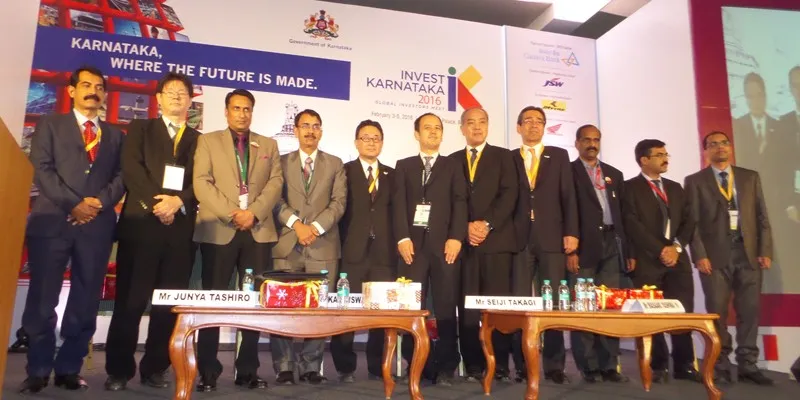Industrial development in Karnataka in a sustainable and inclusive way – with a touch of Japan
The manufacturing industry has taken a lot of flak for environmental damage and trampling of human welfare – but progressive companies from countries such as Japan are determined to blaze a new trail, with Karnataka as a partner.
One of the more unusual panels at the Invest Karnataka 2016 meet in Bangalore featured a range of Japanese and Indian business leaders who showed how industry can also work with local communities to build better villages and townships. France, Japan, Sweden, South Korea, UK, Italy and Germany are the official country partners for Invest Karnataka this year (see YourStory’s coverage of these country panels here).

There are over 1,200 Japanese companies operating in India, the second highest of all countries, said Junichi Kawaue, Consul General of Japan in Bangalore. Most Indians would know of Sony, Honda, Mitsubishi and Hitachi, but there are also many other smaller Japanese firms active in India. (US-based venture capital firms have a high profile in India - but there are also investors here from Japan, such as SoftBank and Beenos.)
Toyota Kirloskar
While much attention has focused on factory design and production, the needs of an emerging economy like India also call for improvement of the surrounding external environment, said Shekhar Vishwanathan, Vice Chairman of Toyota Kirloskar Motor.
The Bidadi Industries Association (BIA) was formed by Toyota Kirloskar, Bosch and other companies in Bidadi to collectively lead and execute on community initiatives, explained Rahendra Hegde, DGM of Toyota Kirloskar and CEO of BIA.
To create a model township, BIA has worked on improving local roads, lighting, school infrastructure, drainage and grievance-redressal schemes. Safety is promoted through awareness events, construction of footpaths and dividers along with roads, and roadside water drains.
A helpline has also been launched for local assistance, and health camps and vet camps have been held in over 20 villages. Support is given to women entrepreneurs, and educational assistance for children is provided via math fairs. Local farmers are assisted with installation and funding for sprinkler systems.
“We eagerly look forward to working with other township associations in Karnataka to create model environments and attract more investment in the state,” said Hegde.
Kehin Fie
Some Japanese firms are also improving the pathetic hygiene situation in rural schools where the children of their factory workers study. Companies need to have a broader vision of the society in which they operate, said Masaaki Yashima, Executive Director at Kehin Fie, which has a carburettor plant in Doddabalapur.
The company’s values statement is based on ‘The Five Joys,’ which include fairness, trust and mutual creativity as foundations for being a model corporate citizen. As part of its community responsibility initiative, the company has built toilets and water tanks at schools in Obedanahalli.
More Japanese companies along with their India partners are spearheading such initiatives, said Junya Tashiro, Director General, JETRO Bangalore. Such industry-community-government partnerships hold the key to a number of other challenges as well, such as scaling up the successes of social entrepreneurs (see my book review on ‘Hybrid Value Chains’).







